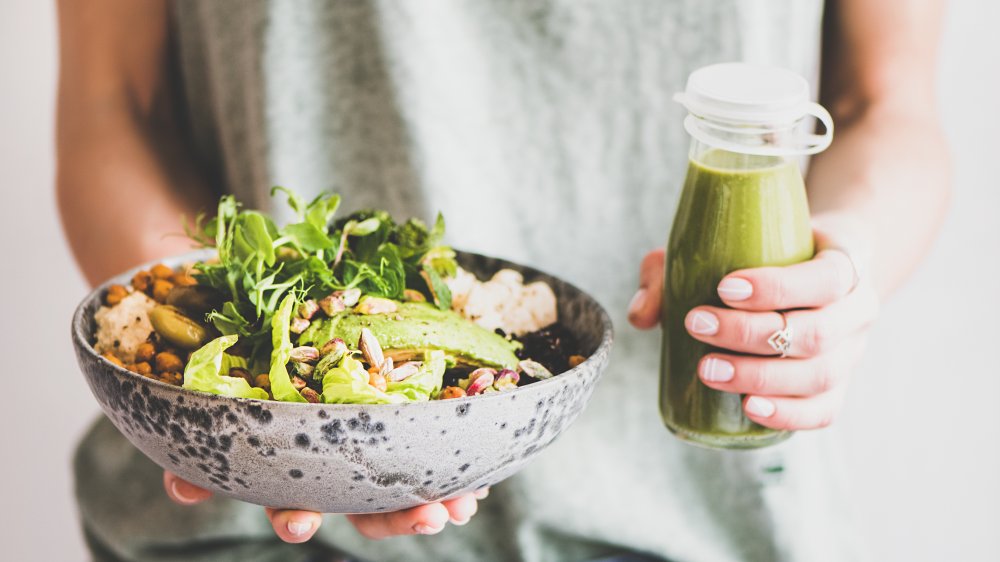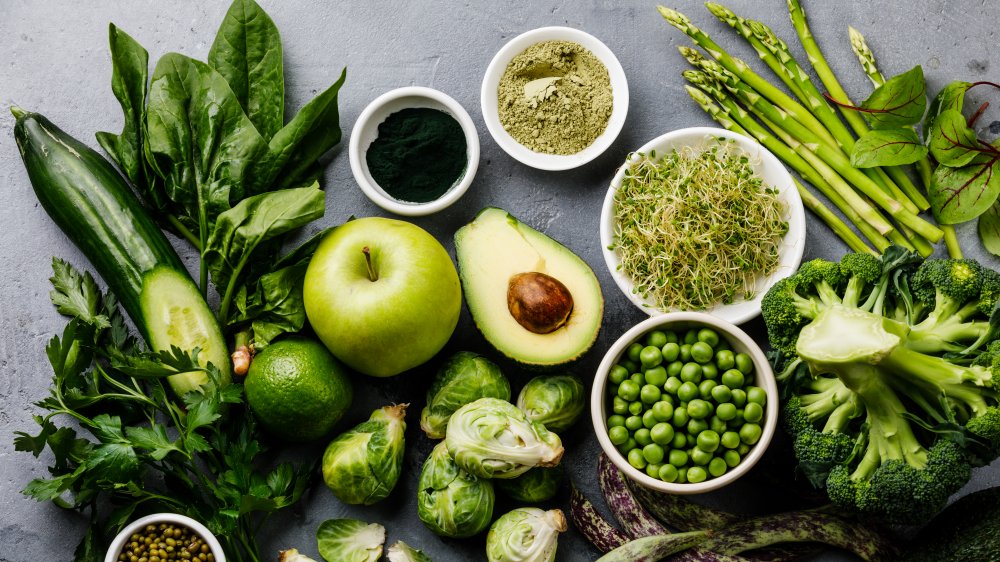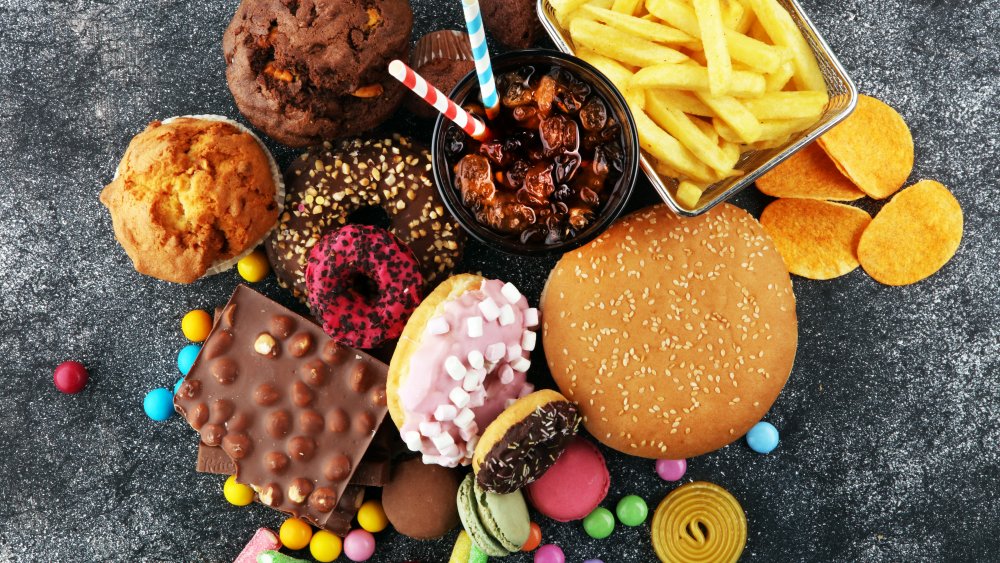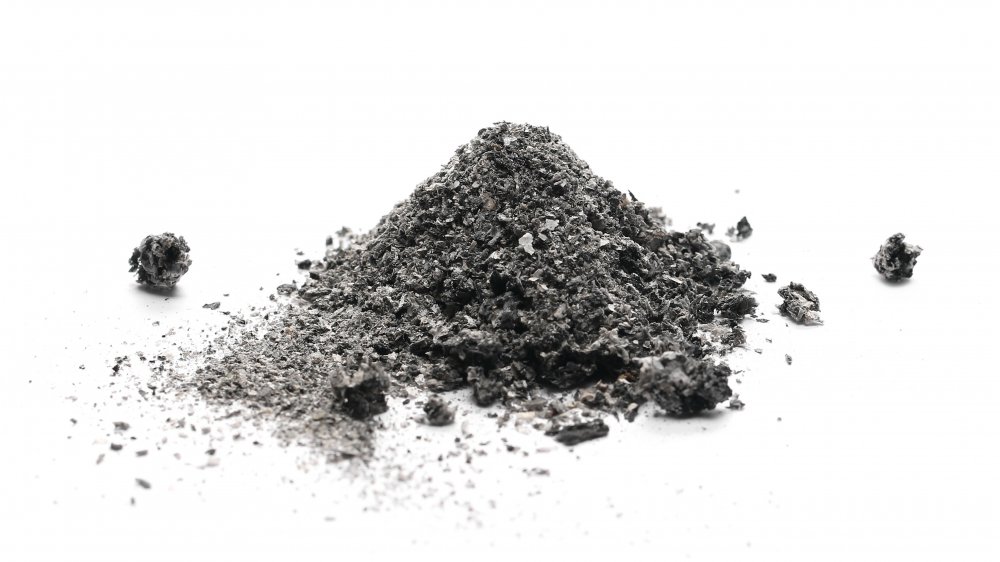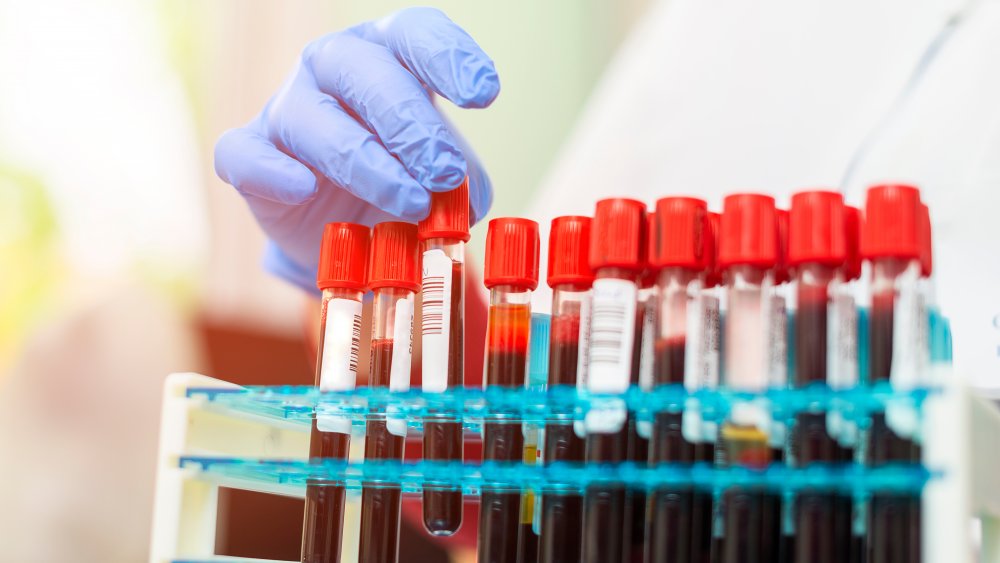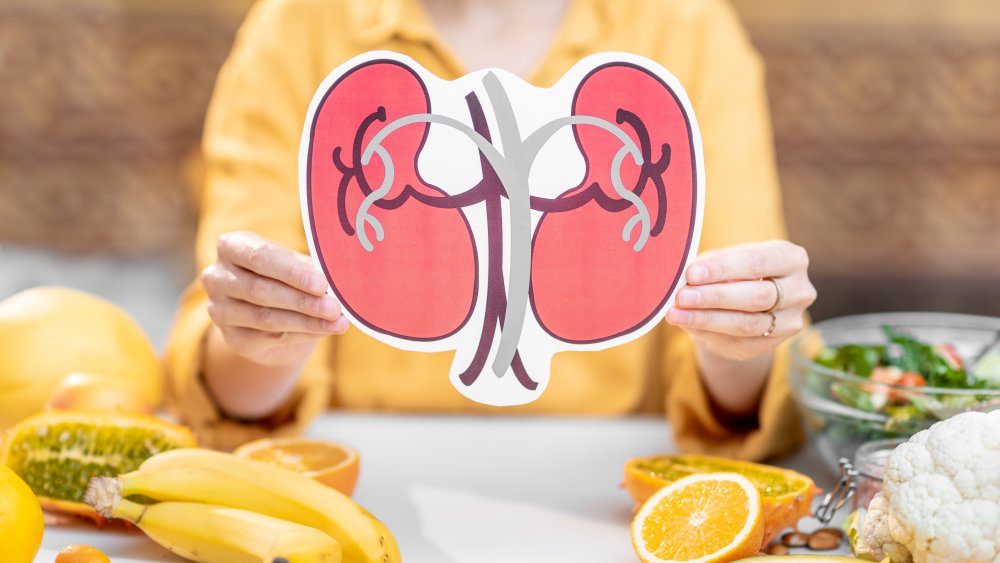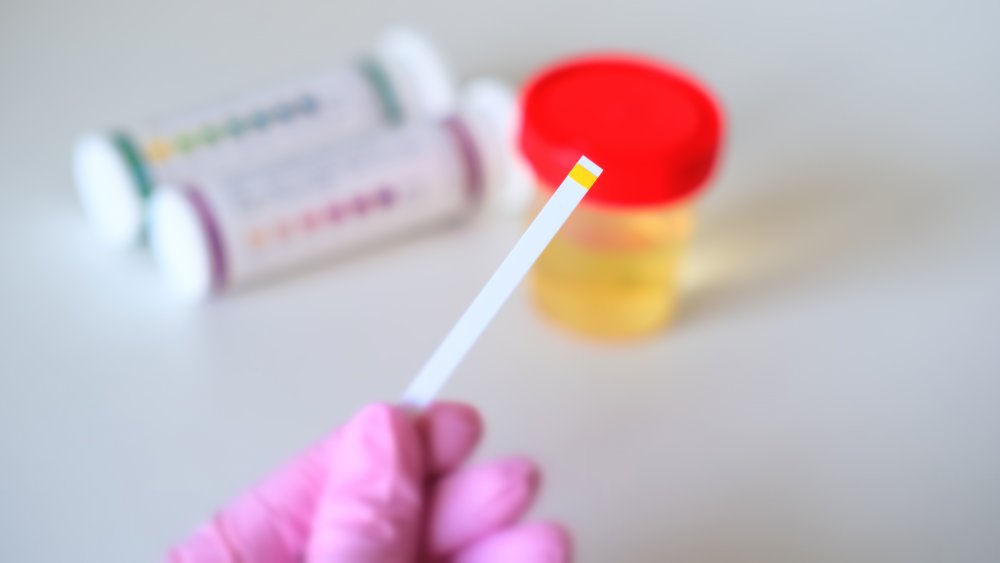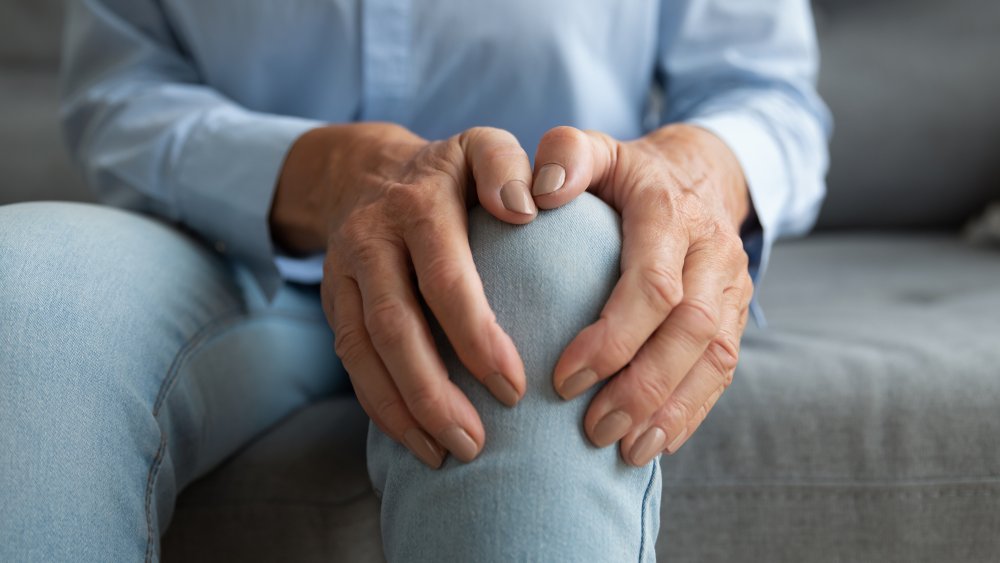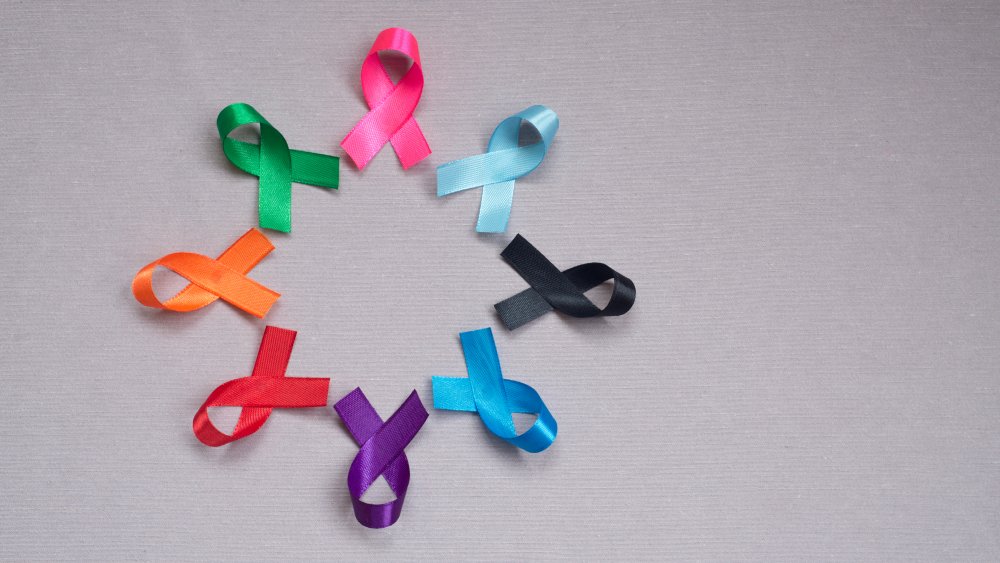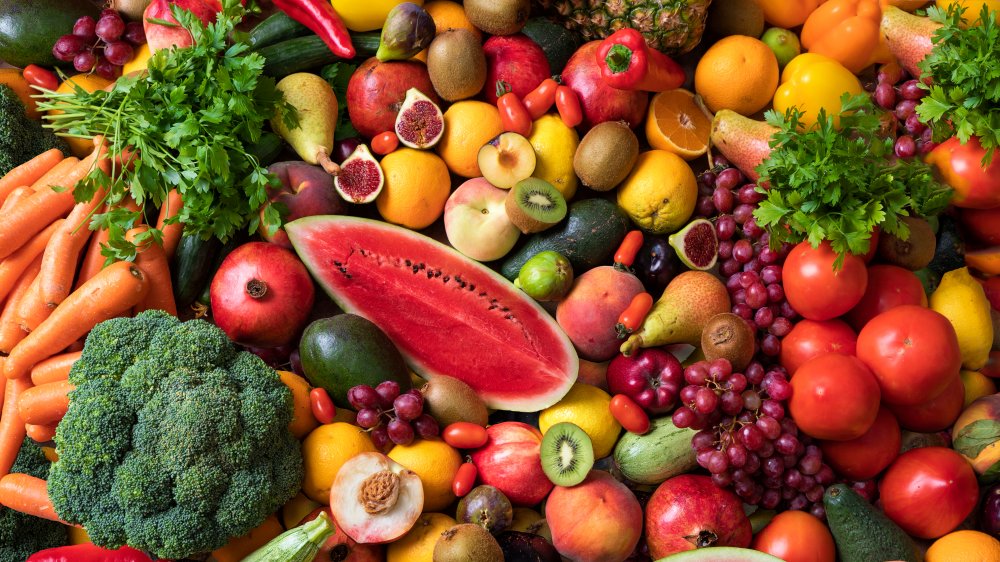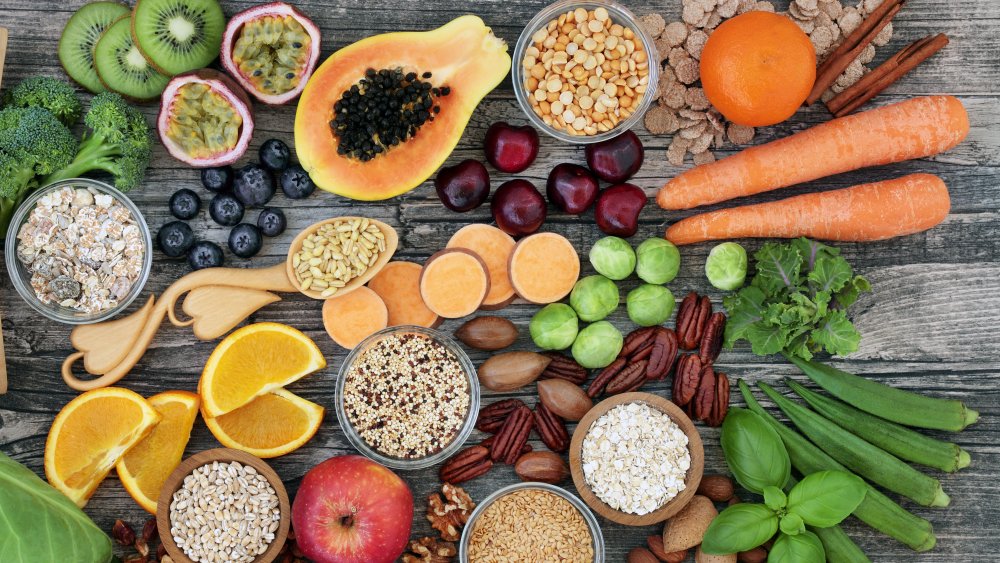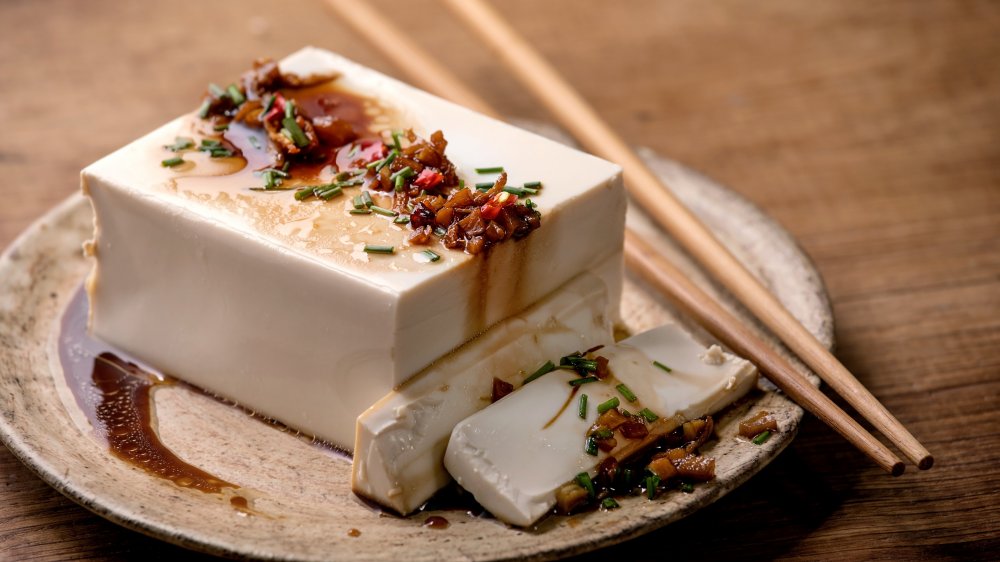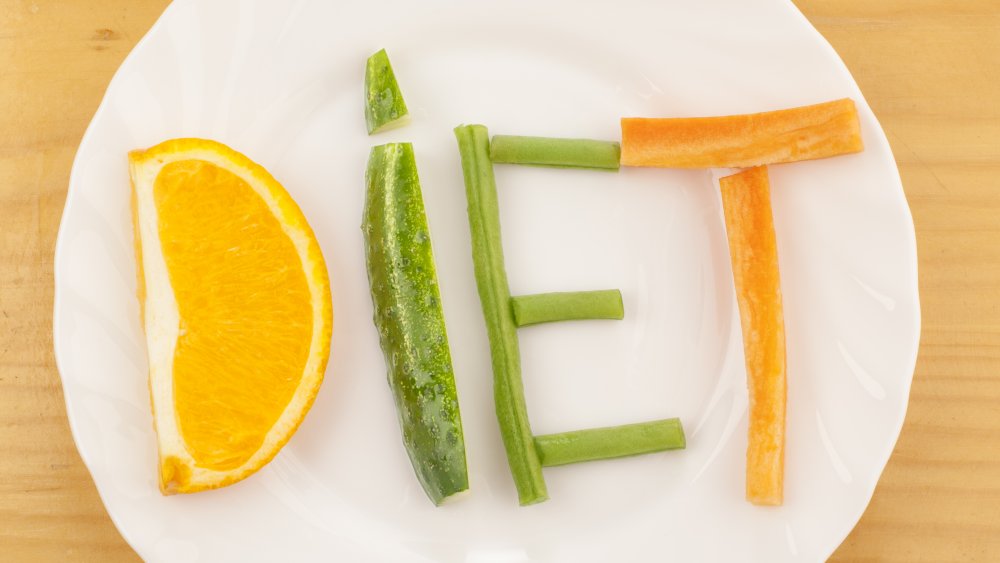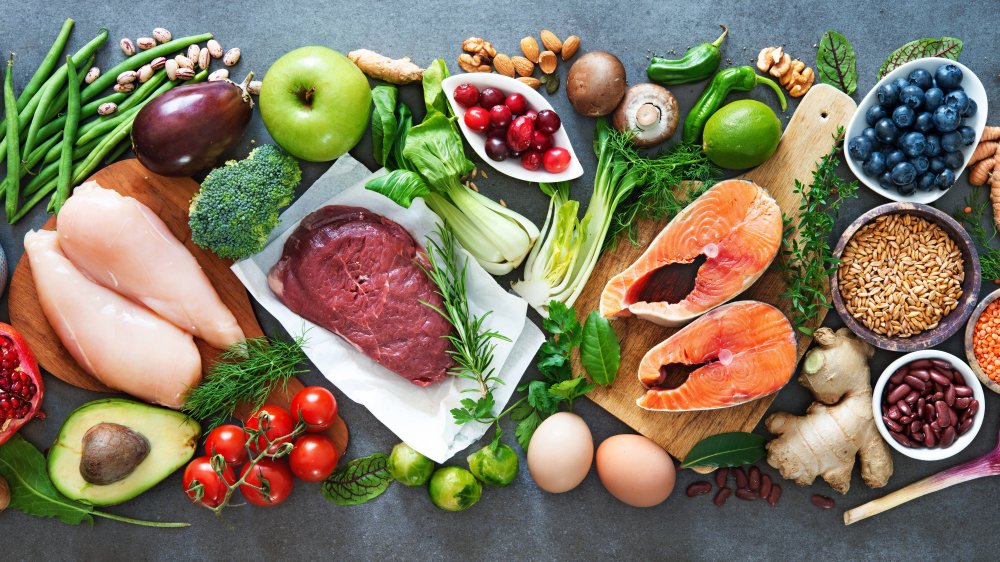Kelly Ripa's Unusual Daily Diet May Surprise You
Kelly Ripa has been talking about her slightly out-of-the box diet since 2015. It's called the alkaline diet, and Ripa isn't the only celeb to rave about its supposed benefits — Jennifer Aniston and Victoria Beckham have spoken about following the diet as well. And, before we get into the specifics on why the diet (spoiler alert!) may not be sustainable long-term, it's worth noting that the famously fit co-host of ABC's Live with Kelly and Ryan is a longtime fan of the plan.
Celebrity nutritionist Daryl Gioffre, who works with Ripa, told Women's Health in February 2020 that the star adheres to the low-alkaline eating plan, and explains that she typically skips breakfast and starts the day with coffee (with coffee alkalizer added in to supposedly reduce the acid content), then sticks to plant-based salads and bowls for lunch and dinner. If you're curious about what the experts and medical community have to say about the alkaline diet and all that it entails, read on to find out.
What is the alkaline diet that Kelly Ripa loves so much?
In a nutshell, Kelly Ripa's go-to diet, the alkaline diet, is built around the idea of replacing acidic foods with alkaline foods, according to Healthline. Quick chemistry refresher: Acidic substances have a pH below 7, while alkaline substances have a pH higher than 7. The purported goal of eating mostly alkaline foods is to balance the pH of your body. Why? Because your metabolism (a series of reactions that break down what you eat) burns food in such a way that leaves behind some "ash" residue, called metabolic waste.
Sometimes this waste is alkaline, sometimes it's neutral, and sometimes it's acidic. Alkaline diet advocates claim that foods that create acidic ash make your blood more acidic, which is thought to make your body more vulnerable to disease. Alkaline ash, on the other hand, is thought to make your blood more alkaline and supposedly protects against disease (via Healthline). The premise of the alkaline diet is essentially this: Alkaline foods are considered health-promoting and acidic foods are considered health-harming.
What foods can you eat on the alkaline diet?
The core tenant of the alkaline diet is to eat alkaline foods. According to Everyday Health, Alkaline foods include fruit (especially raisins and black currants), unsweetened fruit juices, vegetables, potatoes, soy, legumes, seeds, nuts, and wine. This is because these foods have a pH above 7, making them alkaline. There are also "neutral" foods (with a pH of 7) that can be included on the diet but should be limited. These neutral foods include natural fats (like olive oil and butter), sugars, and starches.
As you can see, all of the alkaline foods are plant-based. So yes, following an alkaline diet is similar in many ways to following a vegan diet. You'll eat tons of fruits, vegetables, nuts, seeds, legumes, and soy. You'll also eat limited healthy fats like olive oil or avocado oil and eat only a small amount of grains and sugars.
These foods are off-limits on Kelly Ripa's unusual diet
Unfortunately, the list of foods to avoid on the alkaline diet is long. Acidic foods to avoid include meat, poultry, fish, most dairy products, eggs (particularly egg yolks), most grains, alcohol (except occasional wine), regular and diet soda, lentils, peanuts and walnuts, as well as all processed, packaged, and fast food, according to Everyday Health.
Clearly, this diet is incredibly restrictive. Like a vegan diet, it eliminates virtually all animal products. However, small amounts of butter are allowed, as butter contains very little acidic milk protein and is mostly made up of neutral fatty acids. Kelly Ripa's unusual diet also eliminates the vast majority of whole grains, which the 2015-2020 Dietary Guidelines for Americans recommends eating every day as part of a healthy diet. As all processed, packaged, and fast food are off-limits as well, that may restrict many of the snacks and meals you're used to eating. Specific plant foods like lentils, peanuts, and walnuts are often considered healthy, but they are off-limits on the alkaline diet due to their high acid content.
Kelly Ripa's go-to diet claims to minimize acid ash in your body
Let's talk a little more about this claim that eating alkaline food and avoiding acidic food reduces the amount of acidic ash — that is, the metabolic waste produced when your body breaks down acidic food. The acid-ash hypothesis, as it's called, has been around for a while. When acidic ash is produced, there are excess protons in your body, and so your bone erodes to release calcium ions and provide an alkaline buffer and eliminate those free-floating protons, according to the hypothesis.
Without getting too deep into the science, the theory is that foods high in protein, sodium, and phosphorus are acid-forming, and thus contribute to bone erosion and other negative health effects. But while this could theoretically happen in our bodies, there's not really any evidence that this is actually the case. In fact, there's no high-quality evidence that eating a high-acid diet leads to bone mineral loss or other negative health affects.
Whether you're on the alkaline diet or not, your blood pH is always slightly alkaline
One issue with the whole idea of eating alkaline foods to keep your body alkaline: Your blood is always at least slightly alkaline, according to Healthline. In healthy people, the body does a great job of keeping the blood pH between 7.35 and 7.45, which can be considered slightly alkaline (because it's above 7). Being outside of this range is a sign of a "slight imbalance or a health condition," according to the publication. "In most cases, your blood pH will balance out once the cause goes away or is treated."
Your body is a complex machine that knows how to keep itself running, and there's no need to try to run interference unless advised by your doctor. In your blood, there's a buffer system involving carbonic acid and bicarbonate ions. These compounds are constantly in motion, ensuring that your blood pH is tightly regulated. "In a healthy person," Healthline explained, "diet does not affect blood pH."
The kidneys are responsible for regulating blood pH
Your lungs are partly responsible for maintaining the perfect acid-base balance and 7.35-7.45 pH in your blood as they release into your bloodstream the carbon dioxide that contributes to carbonic acid. However, it's your kidneys that do most of the work. Frankly, the actual chemical mechanisms that explain how this happens are complex, but essentially, "the kidney excretes or reabsorbs these substances which affect pH," according to a 2020 review by medical experts.
For this reason, people with late-stage renal (kidney) disease who aren't on dialysis (a medical procedure that mimics kidney function by filtering your blood through a machine) do actually need to eat a diet that's low in protein, phosphorus, and sodium, much like the alkaline diet. That said, people with healthy kidneys won't see any changes to their blood pH from eating this diet, since their kidneys will effectively keep the blood in the perfect range.
The alkaline diet does make your urine more alkaline
In order to keep your blood at the right pH (between 7.35 and 7.45), your kidneys do their thing in filtering excess acid or base into your urine. While people who follow the alkaline diet, like Kelly Ripa, won't see any changes to the pH balance of their blood, they will have more alkaline urine. That's not a bad thing, but it's not beneficial in any way either. All it means is that the body needs to excrete the extra bases (alkaline components) that the blood contains in order to maintain the right pH balance.
Unlike your blood, the "normal" pH range for urine is wide. Usually, urine ranges from slightly acidic to slightly alkaline, and actually sits closer to the acidic end, with pH usually ranging from 6.0 to 7.5. But any pH between 4.5 to 8.0 is considered normal. And this is all because your kidneys work hard to maintain a strict blood pH balance, and does that by eliminating the necessary acid or base components through your urine.
There's no evidence that Kelly Ripa's unusual diet protects against osteoporosis
Proponents of the alkaline diet believe that it can help prevent osteoporosis, the weakening of bones over time, by eliminating the need for your bones to leech calcium in order to neutralize extra protons in your blood created by phosphorus, sodium, and protein. However, a 2012 systematic review in the Journal of Environmental and Public Health found that while an alkaline diet can lead to more alkaline urine and lower calcium losses in urine, there's no evidence that eating an alkaline diet actually prevents against osteoporosis.
This is because higher levels of calcium in the urine don't necessarily relate to inadequate amounts of calcium in the body. And, it's now understood that calcium levels aren't the only factor in the development of osteoporosis — other nutrients, including sodium, protein, and iron, also play a role in bone health and preventing osteoporosis.
There's no evidence that the alkaline diet protects against cancer
Proponents of the alkaline diet claim that the diet has the power to reduce their risks for certain diseases. However, researchers take serious issue with this claim. A 2016 systematic review published in the BMJ Open set out to examine this claim. In the introduction, the study authors expressed concern over the claims floating around about the alkaline diet, including the suggestion that it protects against cancer.
To set the record straight, researchers combed through 8,278 citations and reviewed 252 abstracts. After which, the experts found only a single study that even "met the inclusion criteria." The authors concluded, "Despite the promotion of the alkaline diet and alkaline water by the media and salespeople, there is almost no actual research to either support or disprove these ideas." They continued, writing, "Promotion of alkaline diet and alkaline water to the public for cancer prevention or treatment is not justified."
Eating lots of fruits, vegetables, and nuts on the alkaline diet comes with health benefits
It's not entirely fair to say that following an alkaline diet has no protective effects. While the core theory of the alkaline diet — eliminating acid ash in order to improve health outcomes — is not evidence-based, there's a part of this diet that is great. It calls for consumption of fruits, vegetables, nuts, seeds, and legumes — all of which have health benefits, albeit none that have to do with their alkalinity.
According to Harvard's The Nutrition Source, a diet high in fruits and vegetables (at least five servings per day) can lower blood pressure as well as reduce the risk of heart disease, stroke, eye problems, and digestive issues. Eating fruits and veggies can also prevent some types of cancer and promote blood sugar control, which can help regulate your appetite. Nuts and seeds are seriously healthy, too. "We found that people who ate nuts every day lived longer, healthier lives than people who didn't eat nuts," Dr. Frank Hu, professor of nutrition and epidemiology at the Harvard T.H. Chan School of Public Health, told Harvard Health, referencing a 2013 study that he co-authored.
Replacing processed food with whole, plant-based foods is a healthy component of the alkaline diet
The alkaline diet can do some good — "just not for the reasons proponents of the diet claim," MD Anderson Cancer Center explained. It calls for eating plant-based foods and cutting out processed foods, which is definitely not a bad thing.
While a 2019 systematic review published in Translational Psychiatry found that more research needs to be done before we can say that plant-based diets cause better health outcomes, a 2016 physicians guide published in The Permanente Journal explained that plant-based diets are certainly associated with all kinds of positive health outcomes.
As the 2019 review explained, "it is not clear whether putative effects are due to the diet per se, certain nutrients of the diet (or the avoidance of certain animal-based nutrients) or other factors associated with vegetarian/vegan diets." However, across the board, research shows positive findings. That said, you may not have to stop eating meat entirely. By upping your plant consumption and lowering your meat consumption, you'll likely see many health benefits.
If you decide to try Kelly Ripa's unusual diet, be sure to eat enough protein
While Kelly Ripa may swear by her way of eating, you don't need to follow the alkaline diet to become the picture of health. You can get all the supposed benefits of it by eating mostly plant foods as part of an overall healthy diet, without having to go through the trouble of constantly worrying about the acid or alkaline nature of everything you eat. But, if you're still wanting to give the alkaline diet a try, you're going to want to make sure to get enough protein.
Men and women should aim to get 10 to 35 percent of their total calories from protein, as SF Gate explained. More specifically, experts recommend eating at least 0.8 grams of protein per kilogram of bodyweight. And while it's totally possible to get this from only plant-based foods, it's important to prioritize plant-based proteins like nuts, seeds, and legumes.
The good news is that this can be pretty quick and easy. "One of the beauties of plant proteins, like canned beans, is that you don't have to do much prep. Making a plant-based lunch or dinner can often be much faster than waiting for takeout to arrive," Amy Gorin, registered dietitian nutritionist, told NBC's Today.
Kelly Ripa's unusual diet may eventually lead to weight gain
The alkaline diet is very restrictive. Not only are animal products off the table, but alkaline dieters aren't supposed to eat any kind of convenience foods, like processed food, packaged food, and fast food nor alcohol (sans wine), or good-for-you grains. This makes the diet difficult to adhere to. You'll have to cook most of your meals while on the alkaline diet, and probably take more trips to the grocery store to load up on fresh, perishable food.
It's also a mental and emotional challenge to restrict so many delicious foods. And when you constantly deprive yourself of the foods you love to eat, it's likely that you'll eventually "fall off the wagon" of your diet and overeat these forbidden foods. A 2013 review published in Frontiers in Psychology confirmed this, and added that in many of the studies they reviewed, being on a restrictive diet was actually a predictor of weight gain in the long term. This is partially because it increases the likelihood of binging.
Instead of strictly following the alkaline diet, consider eating mostly nutritious foods and limiting less-healthy ones
Following the alkaline diet and other eating plans and crash diets that restrict specific foods and glorify others are never really worth trying. The tenants of healthy eating are, at their core, simple, and they really don't change. "The key benefits of this approach seem to stem from guidelines you've already heard a million times: eat more fruits, veggies, and plants; cut back or cut out sugar and processed foods; and slash your sodium intake," dietitian Cynthia Sass told Health.
As of this writing, there's no evidence to believe that the alkalinity or acidity of foods can have any impact on the average person's health. Use Sass' no-nonsense suggestions (which are also backed up by the 2015-2020 Dietary Guidelines for Americans and pretty much every legitimate nutrition expert) to guide your overall healthy diet. But don't totally cut out the foods you love that might be less nutritious. Eating good-for-you foods most of the time will give your body the nutrients it needs to stay healthy.


